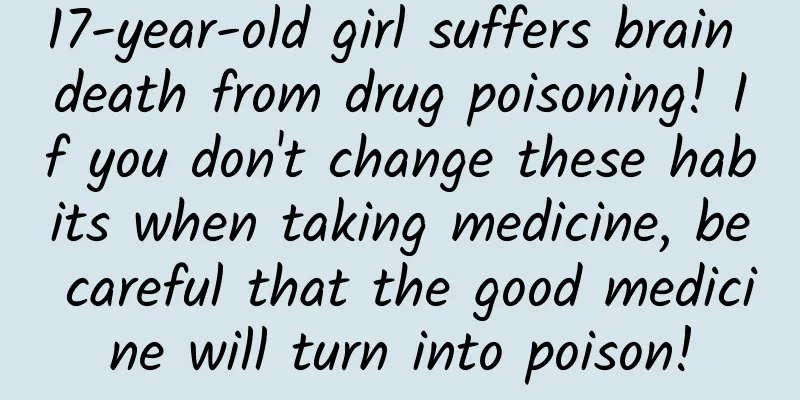17-year-old girl suffers brain death from drug poisoning! If you don't change these habits when taking medicine, be careful that the good medicine will turn into poison!

|
Expert of this article: Pan Kunming, Master of Pharmacy from Peking University, Chief Pharmacist of Zhongshan Hospital Affiliated to Fudan University Recently, "17-year-old girl Xiaoyu (pseudonym) took medicine and fell into a deep coma, resulting in brain death" became a hot topic. Fortunately, she was rescued after timely treatment in the ICU. This incident also serves as a wake-up call for us: we must keep medication safety in mind! Each drug has a prescribed usage and dosage, which is determined after a large amount of scientific research (including animal experiments and clinical trials). Once an overdose is used, it is very likely to cause poisoning, and in severe cases, it can even lead to death! Reading this article carefully is of great significance to preventing and reducing the occurrence of drug poisoning! What are the common drugs that cause poisoning? According to statistics, the most common drug categories include the following: 1. Antipyretic and analgesic drugs (such as acetaminophen, ibuprofen, aspirin, etc.); 2. Antidepressants (such as bupropion, trazodone, citalopram, fluoxetine, etc.); 3. Opioids (such as morphine, fentanyl, etc.); 4. Sedatives and hypnotics (such as alprazolam, clonazepam, lorazepam and other benzodiazepines; zolpidem, eszopiclone and other non-benzodiazepine agonists); Copyright image, no permission to reprint 5. Antihistamines/antiallergic drugs (diphenhydramine, hydroxyzine); 6. Sympathomimetic drugs (such as cocaine, amphetamine, etc.); 7. Cardiovascular drugs, including beta-blockers (such as metoprolol, propranolol, etc.), cardiotonic digoxin, calcium channel blockers (such as amlodipine, diltiazem). Antihypertensive drugs clonidine, antiarrhythmic drugs (amiodarone, verapamil, etc.), angiotensin converting enzyme inhibitors (such as lisinopril, etc.); 8. Antipsychotic drugs (such as quetiapine, olanzapine, etc.); 9. Others such as alcohol, hypoglycemic drugs, cough and cold medicines, anti-epileptic drugs, antibacterial agents, pesticides, etc. Drug poisoning can be caused by: Under the prescribed dosage, it can exert therapeutic effects and produce the smallest possible toxic side effects; but once it is overdosed, the toxic effects will greatly increase and can easily lead to poisoning! For children, the main causes of poisoning are accidents, accidental ingestion, etc., so medicines should be kept as "high and far away" as possible, out of the reach of children. Most cases of poisoning in adults are due to intentional ingestion or even suicide. What are the symptoms of drug poisoning? Poisoning by different drugs will have different symptoms, but the symptoms will vary depending on the type of drug, dosage, health status of the person taking the drug, etc., so it is difficult to generalize. In general, drug poisoning requires observation of the following aspects: Characteristic smell For example, poisoning by salicylates such as aspirin will cause the mouth to smell like acetone (fruity). Cyanide poisoning will cause the mouth to smell like bitter almonds. Poisoning by arsenic, organophosphates, etc. will cause the mouth to smell like garlic. Pupil changes Some drugs can cause mydriasis (such as ephedrine, atropine, antihistamines, anti-Parkinson's drugs, etc.), some drugs can cause mydriasis (such as morphine, fentanyl and other strong opioid analgesics, sedatives and hypnotics, alcohol (deep coma), pesticides, etc.), and some drugs can cause nystagmus (such as barbiturate antipsychotics, carbamazepine, phenytoin and other anti-epileptic drugs, toxic alcohol, etc.). Copyright image, no permission to reprint Neuromuscular abnormalities Some drugs can cause seizures (such as pesticides, antidepressants, antipsychotics, etc.), some drugs can cause tremors/myoclonus (such as lithium, antipsychotics, anticholinergics, antihistamines, etc.), some drugs can cause rigidity/parkinsonism (such as antipsychotics, the antiemetic metoclopramide, carbon monoxide poisoning, etc.), some drugs can cause choreoathetosis (such as cocaine, anticholinergics, antihistamines, antiepileptic drugs, etc.), and some drugs can cause weakness/paralysis (such as heavy metals, pesticides, nicotine, neurotoxic snake venom, pufferfish, etc.). Altered mental status A large number of drugs can cause central nervous system inhibitory states such as drowsiness, coma, and apathy (such as anticholinergics, antihistamines, sedative-hypnotics, antidepressants, etc.), and some drugs can cause agitation/anxiety (such as the cold medicine amantadine, sympathomimetics, anticholinergics, etc.). Skin changes Some drugs can cause reddening and flushing of the skin (such as anticholinergic drugs, antihistamines, atropine, alcohol, etc.), some drugs can cause pallor and sweating of the skin (such as sympathomimetics such as ephedrine, pesticides, etc.), and some drugs can cause peeling of the skin (such as heavy metals such as arsenic and mercury). Changes in body temperature Some drugs can cause hyperthermia (such as sympathomimetics, anticholinergic drugs, antihistamines, salicylates, etc.), and some drugs can cause hypothermia (such as morphine analgesics, sedatives and hypnotics, beta-blockers for the treatment of cardiovascular disease, etc.). Copyright image, no permission to reprint Changes in blood pressure and heart rate Some drugs can cause hypertension with tachycardia (such as sympathomimetics, anticholinergics, antihistamines, etc.), and some drugs can cause hypertension with bradycardia (such as α-adrenergic agonists, pesticides, hormones, etc.). Some drugs can cause hypotension with tachycardia (such as salbutamol, β-adrenergic agonists, alcohol poisoning, etc.), and some drugs can cause hypotension with bradycardia (such as β-blockers, calcium channel blockers, cardiotonic drugs, sedatives, hypnotics, etc.). Breathing disorders Some drugs can cause tachypnea/hyperpnea (such as sympathomimetics, anticholinergics, salicylates, etc.), and some drugs can cause dyspnea/hypopnea (such as central nervous system depressants, pesticides, puffer fish poisoning, etc.). What should I do in case of drug poisoning? The treatment of drug poisoning varies from drug to drug and from person to person. Once severe discomfort occurs and it is difficult for the individual and family to handle, go to the hospital for treatment in time! The measures we can take include: decontamination, rapid detoxification, enhanced removal, and supportive treatment. ● Decontamination: For poisoning on the skin surface, flush with plenty of water or saline; for poisoning by oral drugs, oral activated carbon is the first choice, and some require further gastric lavage, enema, catharsis, or even surgery. When inducing vomiting, be aware of the risk of aspiration and suffocation! ● Antidote: Some drug poisonings have specific antidotes, but most poisons do not have antidotes, so antidotes are only used in a few cases. Copyright image, no permission to reprint ● Enhanced clearance techniques: When the drug has been absorbed, there are some enhanced clearance techniques in medicine that help to remove the drug from the blood, including forced diuresis, alkalinization or acidification of urine, hemodialysis, hemoperfusion, hemofiltration and exchange transfusion therapy. ● Supportive treatment: During the detoxification process, other aspects of the patient's condition must be ensured. For example, blood pressure should be increased for low blood pressure; high body temperature should be cooled down, etc. Avoid further damage to the body due to poisoning symptoms! Be sure to follow your doctor's instructions when taking medication, read the instructions before taking the medication, and pay attention to the following points: ● Do not increase the dose at will: the toxic dose of some drugs is very close to the commonly used dose; ● Sustained-release and controlled-release agents: Some cannot be broken or chewed, otherwise they will be released too quickly; ● Do not use medications together at will: For example, some compound cold medicines contain acetaminophen, and excessive combined doses can cause liver failure. In conclusion Beware of drug poisoning Each drug is very different Respond correctly, seek medical treatment promptly and don't panic The cover and watermarked pictures of this article are from the copyright gallery. The pictures are not authorized for reprinting. |
<<: It's about aging: The secret of blood aging after 70 years old is revealed
Recommend
How to treat women’s urinary urgency, frequent urination and inability to urinate completely?
Many women experience frequent urination, urgency...
How harmful is it for women to hold their urine?
Women are already at a disadvantage in the workpl...
Having children still has polycystic ovaries
There are many patients with polycystic ovary in ...
One day after medical abortion, intrauterine disorder echo
Medical abortion is a method of abortion that man...
What if there is an embryo but no fetal heartbeat?
After learning that they are pregnant, many frien...
Symptoms of failed cerclage
For many couples, having a baby of their own is a...
Worried about the risk of sudden death? How can people in the workplace stay healthy?
According to the 2022 Workplace Health Insights R...
Why do girls have bloating?
Abdominal bloating is most likely caused by some ...
Is the dot-shaped embryo bad?
Prenatal check-up is a very common thing for ever...
Do you want to know some small questions about myopia surgery?
Many people have tasted the sweetness of myopia s...
How to treat constipation and irregular menstruation?
There are many factors that cause irregular menst...
How to treat cervical erosion yourself
Cervical erosion is a common disease among women....
Can staying up late cause retinal detachment?
The daily life of a social animal is Busy work du...
Symptoms of vulvar eczema
Female vulvar eczema is a relatively common aller...
How long will it take to give birth if the fingers are eight apart?
When a pregnant woman is about to give birth, if ...









